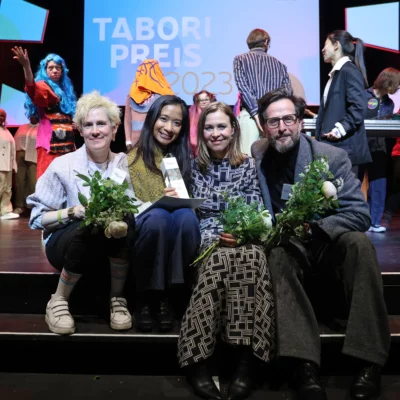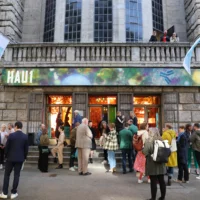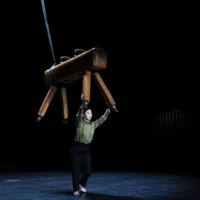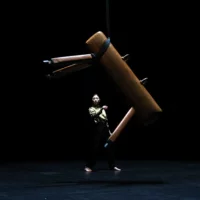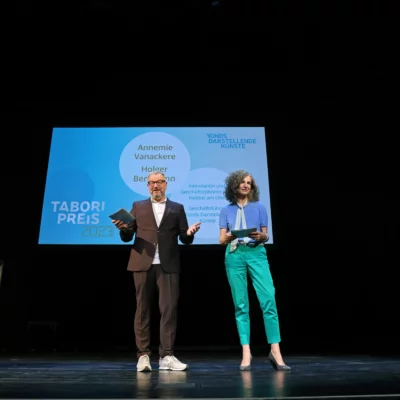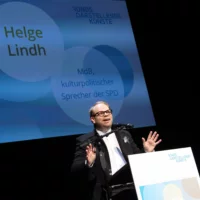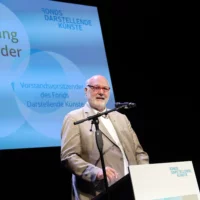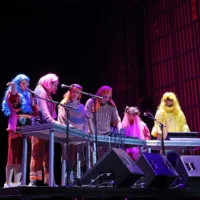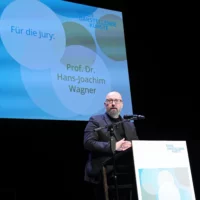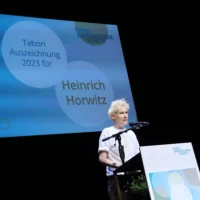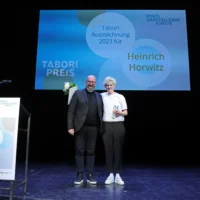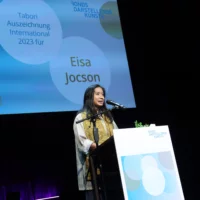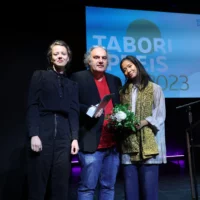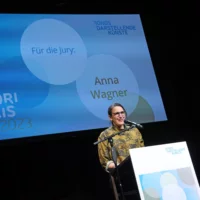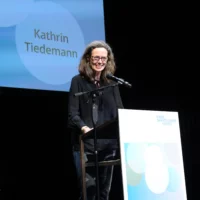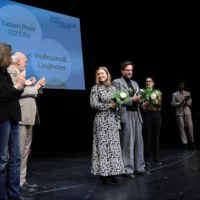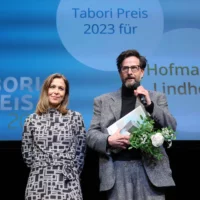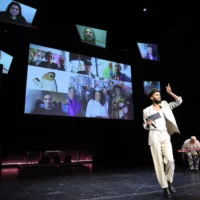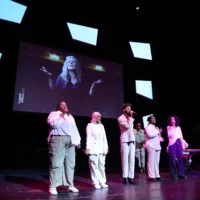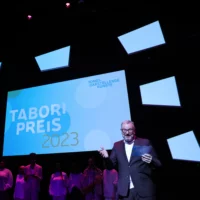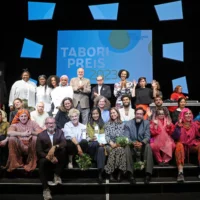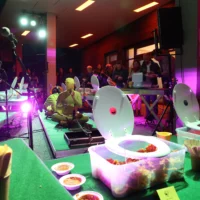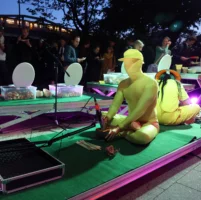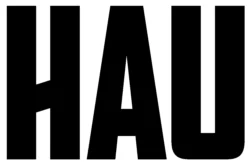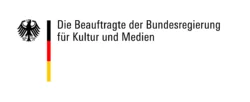Tabori Prize 2023
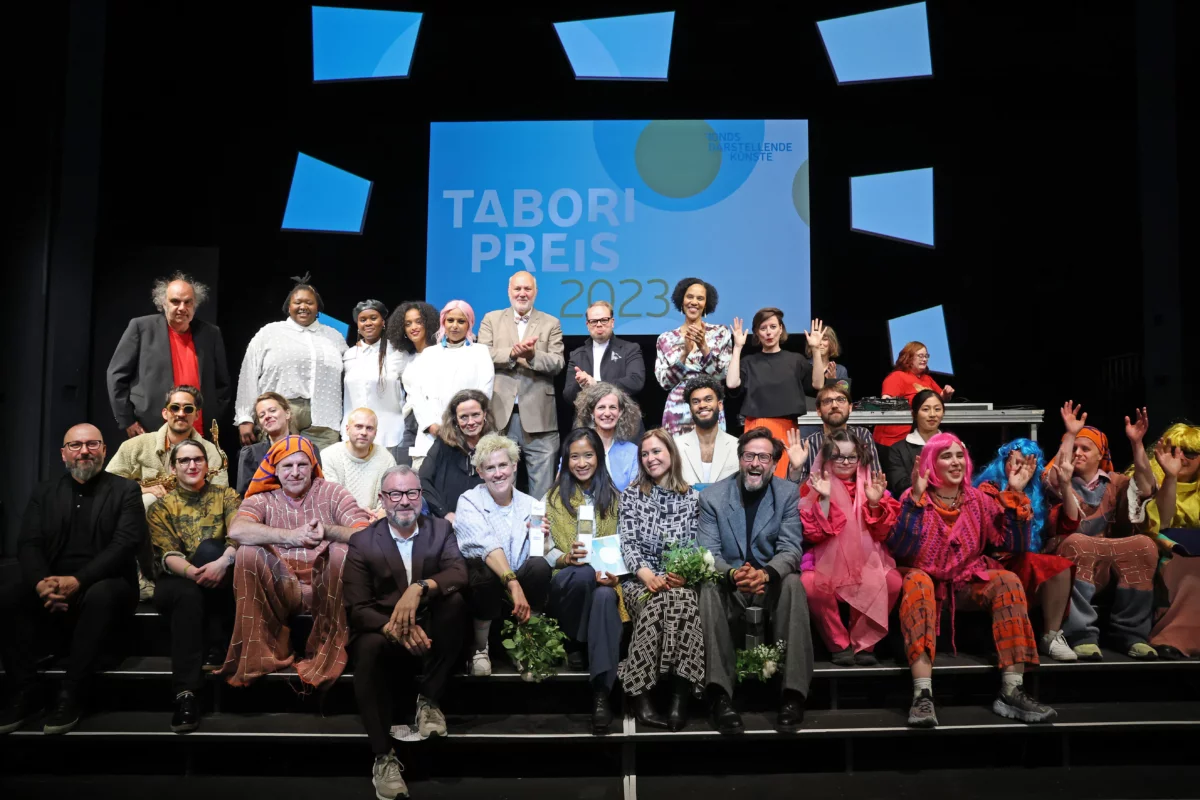 © Dorothea Tuch
© Dorothea Tuch
On May 17, 2023, the Fonds Darstellende Künste awarded the Tabori Prize, Germany's highest honor for the independent performing arts, for the 14th time.
Tabori Award Ceremony
The award ceremony was opened by the speeches of Helge Lindh (Member of the German Parliament, cultural policy spokesman of the SPD) and the chairman of the Fonds Prof. Dr. Wolfgang Schneider. The artistic highlights of the program were provided by the Tabori Award and last year's award winners Overhead Projekt and Meine Damen und Herren. Before the awards and the Tabori Prize were finally presented by the jurors Marta Keil, Matthias Lilienthal, Anna Wagner and Prof. Dr. Hans-Joachim Wagner.
The singer FAYIM led through the evening.
After the award ceremony, the company Soydivision invited to a dinner performance followed by an after-show party at CAN.
Highlights of the Award Ceremony
Tabori Prize Winners 2023
-
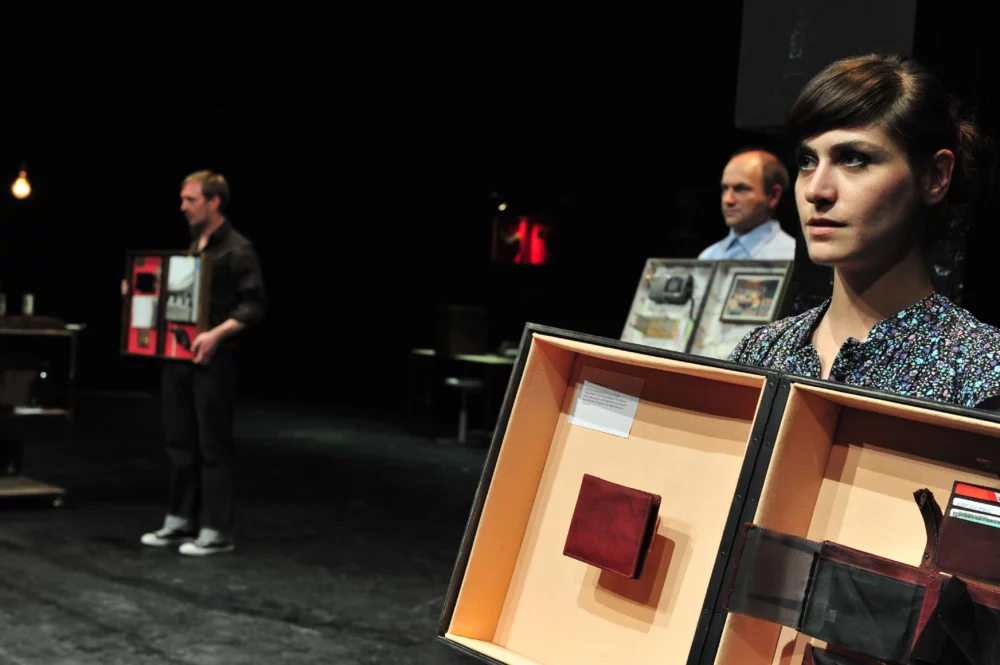 © Sandra Then
© Sandra Then
Hofmann&Lindholm
The Tabori Prize, endowed with 25,000 euros, goes to the artistic duo Hofmann&Lindholm. The jury's statement reads: Hofmann&Lindholm have succeeded "in establishing a completely new approach to the field of performative arts and in shaping a partly documentary format for which there is not yet a term and perhaps cannot be one, except Hofmann&Lindholm.
Credit: Sandra Then
Tabori Auszeichnungen
-
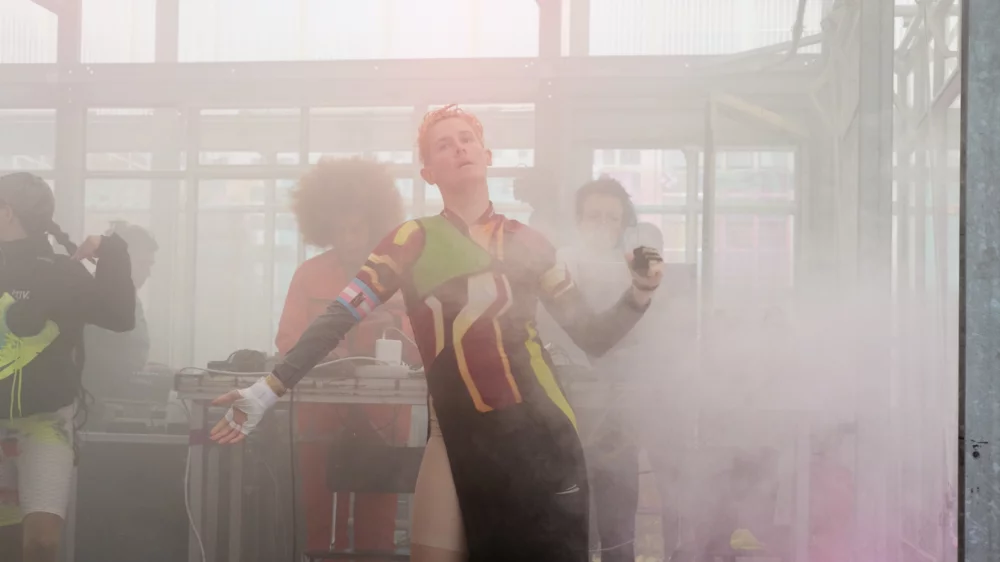 © Katja Feldmeier
© Katja Feldmeier
Tabori Award | Heinrich Horwitz
The Tabori Award, which is endowed with 15,000 euros, goes to director*, choreographer* and actor* Heinrich Horwitz. "Inherent in Heinrich Horwitz's performances is the desire for a community that celebrates diversity and overcomes dissent. The combination of performance, dance, music with activism and lived experiences succeeds in creating surprising, powerful art from a marginalized perspective that breaks forms and is as outstanding as it is singular in the scene," said the jury about its decision.
Credit: Katja Feldmeier
-
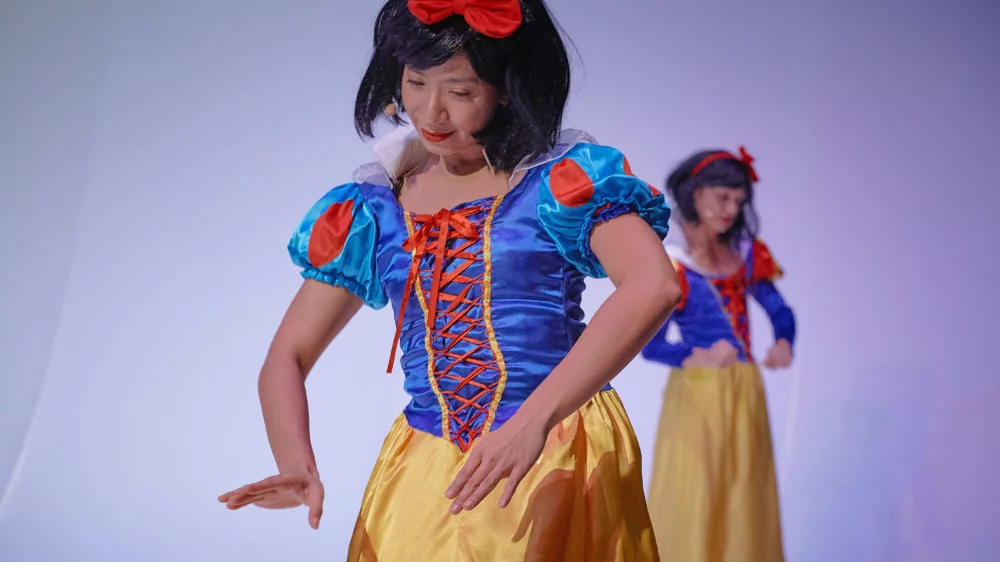 © Anja Beutler
© Anja Beutler
Tabori Award International | Eisa Jocson
For the second time, the Fonds is also presenting an international Tabori Award, also endowed with 15,000 euros. This year the award goes to the choreographer and dancer Eisa Jocson, who comes from the Philippines. The international award jury thus honored one of the "most important voices in contemporary dance" who "shakes up the artistic community both in Manila and internationally by bluntly pointing out the clichés and their concrete, socio-economic and physical consequences that the Western gaze produces."
Credit: Anja Beutler
The Tabori Prize
With the Tabori Prize, the Fonds’ expert jury honors continuous artistic work with a high level of national and international resonance which is relevant in terms of content, sometimes provocative, and has been/is pioneering in terms of format or its aesthetic signature. With the award, the jury celebrates experimental forms from artists and groups who have had a meaningful rise or convinced audiences with their continuous development of an autonomous aesthetic format. The Prize is endowed with €25,000; the Tabori Awards are each endowed with €15,000. The jury selects the winners from all the artists and groups that have been funded by the Fonds Darstellende Künste in the past five years.
In 2023, the Fonds Darstellende Künste will also be awarding a Tabori International Award for the second time in a row to independently producing, internationally active and touring artists (groups) who have impressed with their outstanding aesthetics and committed content. The Tabori International Award is also endowed with €15,000 and is granted by an international jury of experts
Jury national
-
Ute Kahmann
Actress, cultural scientist, puppeteer, director | Berlin
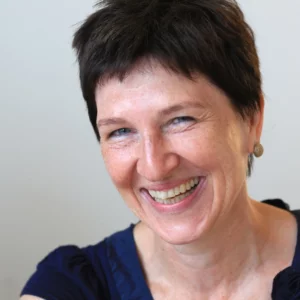 © privat
© privat
Ute Kahmann
Actress, cultural scientist, puppeteer, director | BerlinUte Kahmann studied cultural studies and acting in Berlin. She learned puppetry externally at the Ernst Busch Drama School and at the Figurentheaterkolleg Bochum. She receives directing commissions for theater and dance, has been staging her own productions for adults and children in close collaboration with artists from the visual arts and music since 1988, and plays in the ensemble at the Konzerthaus Berlin, among other venues. From 2006 to 2016 she served on the board of the Association of German Puppet Theaters and from 2014 to 2019 on the board of trustees of the Fonds Darstellende Künste.
-
Carena Schlewitt
Director HELLERAU – Europäisches Zentrum der Künste | Dresden
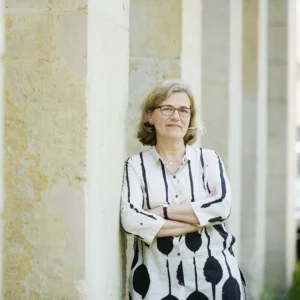 © Stephan Floss
© Stephan Floss
Carena Schlewitt
Director HELLERAU – Europäisches Zentrum der Künste | DresdenCarena Schlewitt was born in Leipzig in 1961. Since 2018, she has been the artistic director of HELLERAU - European Center for the Arts in Dresden.
She was Director of Kaserne Basel from 2008-2018 and Artistic Director of the Basel International Theater Festival (since 2012). She studied theater at the Humboldt University in Berlin and worked at the Academy of Arts in East Berlin from 1985 to 1993. She worked as dramaturge, curator and deputy artistic director at various independent production houses (Podewil Berlin; FFT Düsseldorf; HAU Berlin) and at international festivals (Theater der Welt; HAU Berlin).
The focal points of her work have included the transformation processes in East Germany, Eastern Europe and China and the development of theater in Poland, France and Italy as well as live art and performance art. She has served on various juries, including for the "Impulse" festival; for the German-Polish expert panel of the Kulturstiftung des Bundes as well as for the "Doppelpass" program of the Kulturstiftung des Bundes; she was a member of the expert commission of the Swiss cultural foundation Pro Helvetia.
Carena Schlewitt is a member of the Saxon Academy of Arts, the Saxon Cultural Senate and a member of the Expert Advisory Board for Performing Arts and Music at the Cultural Foundation of the Free State of Saxony.
-
Prof. Dr. Wolfgang Schneider
Chairman of the Fonds Darstellende Künste
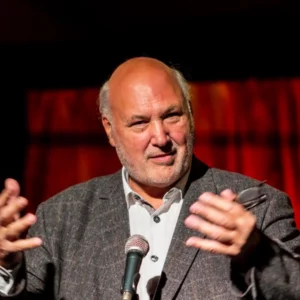 © PAP Branchentreff des LAFT Berlin Foto Mathias Voelzke
© PAP Branchentreff des LAFT Berlin Foto Mathias Voelzke
Prof. Dr. Wolfgang Schneider
Chairman of the Fonds Darstellende KünsteWolfgang Schneider was founding director of the Institute for Cultural Policy at the University of Hildesheim and holder of the UNESCO Chair "Cultural Policy for the Arts in Development" (2014 - 2020). He was the first director of the Children's and Young People's Theater Center in the Federal Republic of Germany, chairman of the Lower Saxony Theater Advisory Board, member of the Goethe-Institut's Dance and Theater Advisory Board and, as an expert member of the German Bundestag's Enquete Commission "Culture in Germany," rapporteur for the chapter on theater, among other things. He is chairman of the Fonds Darstellende Künste e.V., a personal member of the German UNESCO Commission, a trusted lecturer of the Friedrich Ebert Foundation, a member of the federal board of the Cultural Forum of Social Democracy, a member of the board of the Initiative for the Archives of Independent Theater e.V., a member of the International Theater Institute, a member of the Council for Performing Arts and Dance in the German Cultural Council, an honorary member of ASSITEJ Germany and Switzerland, and honorary president of the International Association of Theater for Children and Young People. In 2018, he was awarded the Federal Cross of Merit 1st Class by the German President for his honorary international commitment. Numerous publications on theater policy, editor of, among others, "Theater und Schule. Handbuch zur kulturellen Bildung" (2009), " Theater und Migration. Herausforderungen für Kulturpolitik und Theaterpraxis" (2011), "Theater entwickeln und planen. Kulturpolitische Konzeptionen zur Reform der Darstellenden Künste" (2014), "Theatermachen als Beruf. Hildesheimer Wege" (together with Julia Speckmann, 2017); ""Partizipation als Programm. Wege ins Theater für Kinder und Jugendliche" (together with Anna Eitzeroth, 2017); "Performing the Archive. Studie zur Entwicklung eines Archivs des Freien Theaters" (together with Henning Fülle and Christine Henniger, 2018), "Theater in der Provinz. Künstlerische Vielfalt und kulturelle Teilhabe als Programm" (with Katharina Schröck and Silvia Stolz, 2019); "Theater in Transformation. Artistic Processes and Cultural Policy in South Africa" (with Lance Lebogang Nawa, 2019).
-
Anna Wagner
Artistic Director and Managing Director Künstler*innenhaus Mousonturm | Frankfurt
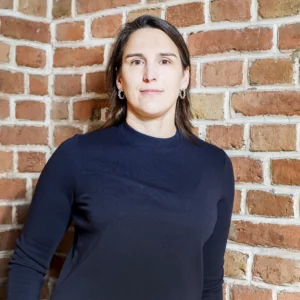 © Maximilian von Lachner
© Maximilian von Lachner
Anna Wagner
Artistic Director and Managing Director Künstler*innenhaus Mousonturm | FrankfurtAnna Wagner has been the artistic director and managing director of Künstler*innenhaus Mousonturm in Frankfurt together with Marcus Droß since September 2022. After studying theater, she worked as assistant dance curator at Hebbel am Ufer in Berlin and directed the dance department at Theater Freiburg, which she transformed from an ensemble company into a production platform for independent choreographers and dancers. In 2014, she moved to Frankfurt's Mousonturm as dramaturg. There she established ongoing working relationships with dance, theater and performance creators from the national and international independent scene such as Paula Rosolen, Eisa Jocson, Helgard Haug/ Rimini Protokoll, Jetse Batelaan and Eisa Jocson among others. She is also co-founder of Tanzplattform Rhein-Main and developed numerous special projects and festivals such as "Indonesia LAB" (2015) "Oper Offenbach" (2018) and "This is Not Lebanon" (2021).
-
Prof. Dr. Hans-Joachim Wagner
Chairman of the Board of Trustees, cultural manager, curator, author, music dramaturge | Düsseldorf, Cologne, Nuremberg
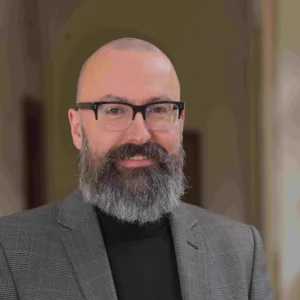 © Stadt Nürnberg/Christine Dierenbach
© Stadt Nürnberg/Christine Dierenbach
Prof. Dr. Hans-Joachim Wagner
Chairman of the Board of Trustees, cultural manager, curator, author, music dramaturge | Düsseldorf, Cologne, NurembergProf. Dr. Hans-Joachim Wagner (born 1961) studied musicology, German philology and art history before working as a cultural manager, curator, researcher and author. He most recently worked as head of the department of music and performing arts at the Kunststiftung NRW in Düsseldorf. Wagner worked at the opera houses in Koblenz and Cologne as a production dramaturge, personal assistant to the artistic director and member of the opera management staff. From 2002 to 2006, he worked as a music referent in the cultural office of the city of Cologne and took over the coordination of the music department during the application of the city of Cologne for the title of European Capital of Culture 2010.
In Cologne, he curated the cultural program for the 2006 World Cup, was artistic director of the festival "Feste Musicali" and the children's and youth music festival "Stadt Klang Fluss". For some time, he has been particularly interested in contemporary dance and theater, the diversity of cultural practice and its visualization.
Since January 2, 2018, the scientist and cultural manager Prof. Dr. Hans-Joachim Wagner has been head of the office for Nuremberg's application for the title of European Capital of Culture 2025.
Jury international
-
Marta Keil
curator, dramaturge, researcher | Warsaw (Poland), Utrecht (Netherlands)
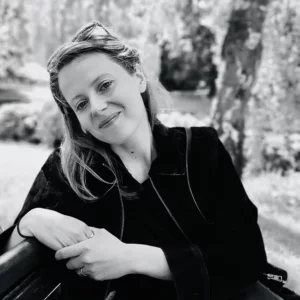 © Danuta Keil
© Danuta Keil
Marta Keil
curator, dramaturge, researcher | Warsaw (Poland), Utrecht (Netherlands)Marta Keil is a performing arts curator, dramaturg and researcher. She currently lives in Utrecht, the Netherlands. Her curatorial and research practice seeks alternative processes of establishing and redefining forms of building transnational alliances in the field of performing arts. She is currently curating the artistic research project "Breaking the Spell", co-produced by Residenz Schauspiel Leipzig, Münchner Kammerspiele, Performing Arts Institute in Warsaw and Viernulvier in Ghent, and collaborating with New Theatre Institute in Riga and Rosendal Teater in Trondheim for the project "The Shakedown". Recently, she curated "Forecast. A School of Thinking-With" for the Dublin Theatre Festival (2021) and co-curated (with Grzegorz Reske) "Politics of Listening" for the North East South West program of the Kunsthaus Dresden and the European Center for the Arts Hellerau in Dresden (2022). She has edited several books on curatorial practice and contemporary choreography and regularly gives seminars on curating, currently at Utrecht University and Jagiellonian University in Krakow. Marta is a member of the Performing Arts Institute (InSzPer) collective in Warsaw and holds a PhD in Cultural Studies.
-
Melat Gebeyaw Nigussie
director of Beursschouwburg | Brussels
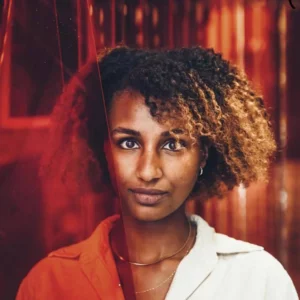 © Jimmy Kets
© Jimmy Kets
Melat Gebeyaw Nigussie
director of Beursschouwburg | BrusselsMelat Nigussie (b. 1991) is director of Beursschouwburg in Brussels. Before taking on this position, she worked as coordinator and curator of the participatory project “Next Generation, Please!” at Palais des Beaux-Arts Brussels. Melat has contributed to the literary publications “Afro-Europese literatuur uit de Lage Landen” (2018), “Being Imposed Upon” (2020) and has published articles in Belgian media outlets such as De Standaard, Bruzz and rekto:verso.
-
Matthias Lilienthal
dramaturge, theater and festival director | Berlin
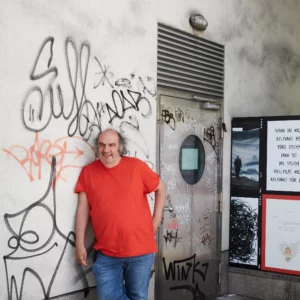 © Judith Buss
© Judith Buss
Matthias Lilienthal
dramaturge, theater and festival director | BerlinMatthias Lilienthal began his career at Theater Basel as dramaturge to Frank Castorf and Christoph Marthaler. He then went on to Berlin's Volksbühne am Rosa-Luxemburg-Platz as chief dramaturge and deputy artistic director, bringing artists such as Christoph Schlingensief and Johann Kresnik to work at the theatre. In 2002 and 2014, he directed the Theater der Welt festival in the Rheintal and Mannheim, and in the 2000s directed HAU Hebbel am Ufer in Berlin, which was named "Theater of the Year" twice during this period in the critics’ survey of the trade magazine, Theater Heute. Lilienthal was director of the Münchner Kammerspiele from 2015 to 2020, transforming it into a hybrid production house / municipal theater. This theatre was also awarded "Theater of the Year" twice during his directorship. Since then, Lilienthal has worked as a festival maker, including "This Is Not Lebanon" at Künstlerhaus Mousonturm and "Performing Exiles" at the Berliner Festspiele, as well as working as a dramaturge, university lecturer and actor.
The Tabori awards ceremony is a Fonds Darstellende Künste event in cooperation with the HAU Hebbel am Ufer. It is funded by the German Federal Commissioner for Culture and the Media.
